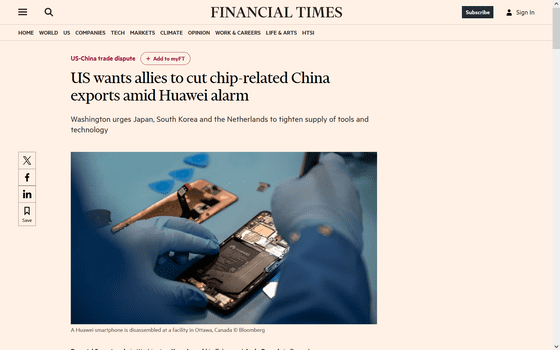The U.S. government is calling on Japan, South Korea and the Netherlands to tighten export controls to China, including suspending the provision of technical services to Chinese factories.

The United States is trying to curb China's semiconductor development by restricting exports to Huawei, among other things. According to a report in the Financial Times, the United States is urging its European and Asian allies to tighten export controls to China, as well as the United States itself.
US wants allies to cut chip-related China exports amid Huawei alarm

The United States introduced sweeping export controls in 2022, prohibiting American citizens and companies from providing direct or indirect support to certain Chinese semiconductor companies. However, the United States is not happy with the continued cooperation of its allies with China, and is concerned about the speed at which China is developing cutting-edge chips, leading to calls for stronger controls from its allies.
According to the sources, the US wants to more aggressively enforce existing export controls on Japan, South Korea and the Netherlands, including by restricting the export of manufactured goods and stopping the export of engineers.

In particular, attention has been drawn to ASML, a Dutch company that has a near monopoly on 'extreme ultraviolet lithography (EUV)' equipment, which is essential for the manufacture of high-performance semiconductors. ASML cannot export EUV to China due to export restrictions imposed by the United States and the Netherlands. However, ASML is permitted to export 'deep ultraviolet lithography (DUV)' equipment, which is used to create semiconductors with lower precision, and China is trying to purchase large quantities of this DUV in order to improve the performance of semiconductors as much as possible.
It has also been

According to the Financial Times, the United States is not asking its allies to create new mechanisms, but is simply asking them to address the problem using existing export control systems. Some allies claim that 'placement of engineers at Chinese companies is necessary to monitor local activities,' so it remains unclear whether such calls will be effective.
Related Posts:
in Posted by log1p_kr






